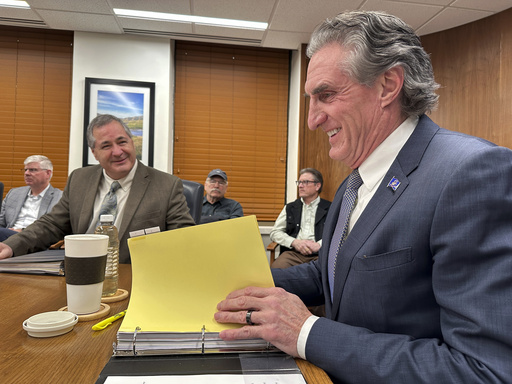BISMARCK, N.D. — Regulators in North Dakota recently granted permits for the underground storage of carbon dioxide via a significant pipeline planned to traverse the Midwest, continuing the project’s ascent despite strong resistance from area landowners.
The Industrial Commission, led by the governor, made a unanimous decision regarding Summit Carbon Solutions’ three proposed storage facilities situated in central North Dakota. Summit has indicated that construction is slated to commence in 2026, with the operational phase expected to start in 2027. However, many landowners opposing the project are likely to initiate legal proceedings aiming to thwart these storage endeavors.
“These permits bring us closer to establishing essential infrastructure that will benefit farmers, ethanol producers, and communities across the Midwest,” commented Wade Boeshans, Summit’s Executive Vice President.
Summit aims to build a 2,500-mile (4,023-kilometer) pipeline, estimated to cost $8 billion, which would ferry CO2 emissions from 57 ethanol plants across North Dakota, South Dakota, Iowa, Minnesota, and Nebraska for underground storage. The compressed carbon dioxide would be transported through this pipeline to be injected deep within geological formations.
The company has already received permits for its proposed route in North Dakota and Iowa, although construction cannot commence just yet. Additionally, Minnesota regulators approved a permit for a 28-mile (45-kilometer) segment connecting to the broader project in western Minnesota.
Recently, Summit submitted another application in South Dakota after its previous attempt was denied last year. The project has met with mixed responses, with legal challenges currently in progress, including an appeal regarding property rights related to the underground storage initiative.
North Dakota Republican Governor Doug Burgum, who presides over the Industrial Commission and has been nominated by President-elect Donald Trump for Interior Secretary, has been a vocal advocate for the state’s potential in carbon dioxide storage, referring to it as a “geologic jackpot.” His administration has also aimed for North Dakota to achieve carbon neutrality by 2030, a goal he set in 2021.
Summit’s proposed storage facilities are projected to accommodate approximately 352 million metric tons of carbon dioxide over a two-decade span, with the pipeline designed to transport up to 18 million metric tons annually to depths of about 1 mile (1.6 kilometers) below the surface, according to the company’s application materials.
Jessie Stolark, leading a coalition that supports the project, indicated that the oil sector has effectively utilized similar technology for years. “We are confident that this can be executed safely while also protecting both human health and underground sources of drinking water,” stated Stolark, the executive director of the Carbon Capture Coalition.
However, the project has sparked significant opposition among local landowners who fear the seizure of their properties for the pipeline while also expressing concerns about possible leaks resulting in dangerous gas releases over their land.
A group representing North Dakota landowners is currently challenging existing property rights laws concerning the underground storage and plans to contest the newly granted permits. Attorney Derrick Braaten mentioned that the landowners he represents are not against carbon sequestration itself but oppose the idea that a private entity can utilize their land without fair negotiations or compensation.
The carbon capture initiative, like Summit’s, qualifies for substantial federal tax incentives aimed at promoting cleaner ethanol production. Critics, however, argue that the amount of greenhouse gases that could be stored through this initiative might be negligible, and they fear it could encourage farmers to increase corn production despite the environmental repercussions.
In Minnesota, regulators approved a route permit linking an ethanol plant in Fergus Falls to Summit’s wider network, enforcing conditions that require construction to begin in North Dakota first. An administrative law judge concluded in November that the environmental effects from the Minnesota portion would likely be minimal, citing that Summit had negotiated agreements with most landowners along the proposed route.
Opposing environmental organizations contested the judge’s assertions, arguing against claims that the project would yield an overall environmental advantage. The Iowa authorities mandated that Summit secure permits for both the routes in the Dakotas and underground storage in North Dakota prior to embarking on construction in Iowa, a stipulation that has led to further litigation regarding the proposal.
In Nebraska, the lack of a state regulatory process regarding CO2 pipelines means Summit is collaborating with individual counties to move the project forward, although at least one county has already denied a permit.



